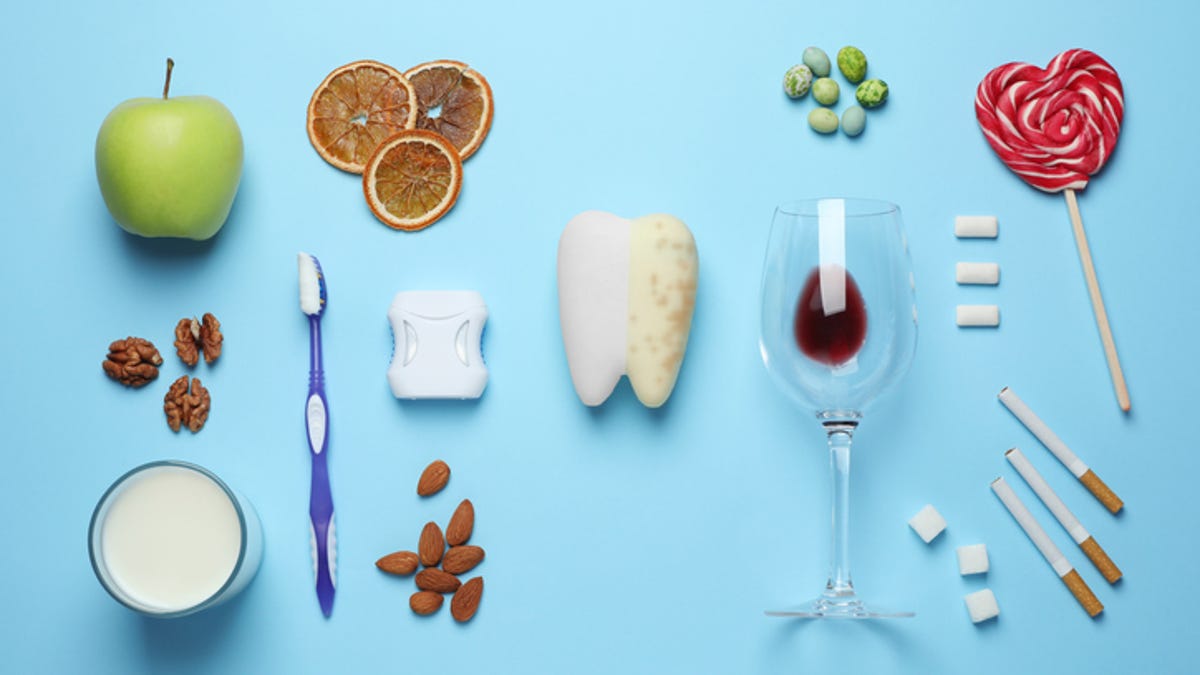 Why You Can Trust CNET
Why You Can Trust CNET Be Kind to Your Mouth This Valentine's Day: Candy Is a Tooth Offender
Here are the top foods that can hurt your teeth and how to safely enjoy candy.

Valentine candy season is upon us. A time full of delicious treats and decadent chocolate, it's also a season of toothaches. The protective enamel layer of your teeth can be eroded or cracked by the food we eat (candy is one of them), which leaves your teeth vulnerable to cavities, tooth decay and sensitivity.
Your teeth aren't invincible. That's why it's crucial you take care of your oral health. Watching what you eat is a part of that. Candy is one of the main culprits, but it's not the only one. Let's go through the foods that erode tooth enamel and how to combat this problem.
Also, learn the truth about oil pulling and why you shouldn't floss after you brush your teeth.
4 foods that are damaging your enamel
1. Candy
You're probably not surprised, but candy is not good for your teeth. Like soda and fruit juices, the sugar content in candy reacts with your mouth bacteria to produce enamel-eating acids. Sour candies, in particular, have more acids that damage your teeth at a higher rate.
The consistency of certain candies is also an issue for your teeth. Gummies and sticky candies can get stuck to the surface and between teeth. Removing them can be difficult, and rinsing your mouth isn't always enough to do the job. While hard candies don't get stuck to your teeth, they are in your mouth longer, which exposes your teeth to more sugar.
How to safely eat candy: If you're going to eat candy, opt for ones that don't stick around in your mouth for long, like chocolate or sugar-free candies. The American Dental Association also recommends enjoying candy with meals or shortly after one, because there's naturally more saliva in your mouth which will help "rinse away" leftover bits.
2. High-sugar drinks
In addition to the disadvantages for your mood and physical health, sugary drinks like soda and fruit juices are one of the leading causes of tooth decay. That's because the sugar in the drinks coats your teeth. Acid is produced when the bacteria in your mouth break down the sugars. Then the acid eats away at your tooth enamel.
Limiting your consumption of sugary drinks is the best line of defense. However, when you drink them, it's best to drink them through a straw to limit their contact with your teeth.
3. Acidic fruits
Food acids are one of the culprits for eroding tooth enamel. Unfortunately, some of the most popular fruits are high in acids. Citrus fruits like oranges, lemons and grapefruits are hard on your teeth because of their vitamin C content. It's not just citrus fruits you should watch for; berries also are acidic.
Dried fruit can also affect your teeth because of their sugar content and consistency. While eating them, they can get stuck on and between your teeth and be difficult to get out.
Before you swear off fruit, you should know the health benefits of fruit -- boosting your immune system and vitamin content -- outweigh the damage they can do to your teeth. Continue to eat fruit. After eating, you can combat tooth decay by rinsing your mouth with water. Alternatively, you can floss and brush your teeth after eating them.
Read more: Should You Brush Your Teeth Before or After Breakfast? It Depends on What You Eat
4. Ice
Every time someone chews on ice, a dentist cries. All jokes aside, chewing on ice is one of the worst things you can do for your teeth. Yes, there is no sugar or acid to break down your enamel. However, chewing on ice can crack or chip your teeth. This can leave you with tooth pain or sensitivity to hot and cold temperatures. Chewing on ice can also threaten the integrity of crowns and fillings.
Opting for shaved or soft ice is a great alternative to traditional ice cubes. It's worth talking to your doctor if you can't seem to break the habit, as chewing ice may be indicative of an iron deficiency, according to the Mayo Clinic.
Which foods stain your teeth?
Tooth decay and damage isn't the only thing that can happen to your teeth. Discoloration or staining on the surface of your teeth can also happen. As we age, the enamel wears down, and our teeth become more yellow. The things we eat also play a large role in the color of our teeth.
Common foods and drinks that can stain your teeth:
- Tea and coffee
- Soy sauce
- Red wine
- Dark sodas
- Berries
- Tomato sauces
- Beats
- Starchy foods
Cutting down on these foods will help save your teeth in the long run. However, it's not realistic to expect anyone to avoid these foods entirely. And you shouldn't have to. Combating tooth decay and staining is as easy as focusing on oral hygiene.
For more on dental health, we can tell you why you shouldn't rinse after you brush your teeth and how to correctly use your electric toothbrush.

